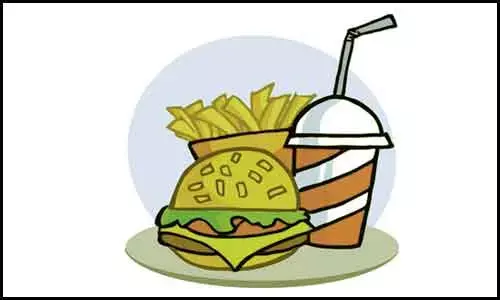- Home
- Medical news & Guidelines
- Anesthesiology
- Cardiology and CTVS
- Critical Care
- Dentistry
- Dermatology
- Diabetes and Endocrinology
- ENT
- Gastroenterology
- Medicine
- Nephrology
- Neurology
- Obstretics-Gynaecology
- Oncology
- Ophthalmology
- Orthopaedics
- Pediatrics-Neonatology
- Psychiatry
- Pulmonology
- Radiology
- Surgery
- Urology
- Laboratory Medicine
- Diet
- Nursing
- Paramedical
- Physiotherapy
- Health news
- Fact Check
- Bone Health Fact Check
- Brain Health Fact Check
- Cancer Related Fact Check
- Child Care Fact Check
- Dental and oral health fact check
- Diabetes and metabolic health fact check
- Diet and Nutrition Fact Check
- Eye and ENT Care Fact Check
- Fitness fact check
- Gut health fact check
- Heart health fact check
- Kidney health fact check
- Medical education fact check
- Men's health fact check
- Respiratory fact check
- Skin and hair care fact check
- Vaccine and Immunization fact check
- Women's health fact check
- AYUSH
- State News
- Andaman and Nicobar Islands
- Andhra Pradesh
- Arunachal Pradesh
- Assam
- Bihar
- Chandigarh
- Chattisgarh
- Dadra and Nagar Haveli
- Daman and Diu
- Delhi
- Goa
- Gujarat
- Haryana
- Himachal Pradesh
- Jammu & Kashmir
- Jharkhand
- Karnataka
- Kerala
- Ladakh
- Lakshadweep
- Madhya Pradesh
- Maharashtra
- Manipur
- Meghalaya
- Mizoram
- Nagaland
- Odisha
- Puducherry
- Punjab
- Rajasthan
- Sikkim
- Tamil Nadu
- Telangana
- Tripura
- Uttar Pradesh
- Uttrakhand
- West Bengal
- Medical Education
- Industry
Ultra-processed foods increase risk of a second heart attack or stroke

Ultra-processed foods are a major public health concern for their potential adverse effects on health.
Now a study by the Department of Epidemiology and Prevention of the I.R.C.C.S. Neuromed in Pozzilli (Italy) explores the health effects of a large dietary share of ultra-processed food on people already suffering from cardiovascular diseases. The findings indicate a higher risk of a second heart attack (or stroke), this time fatal. Moreover, another observation emerges from this study: even in people generally following the Mediterranean diet, but consuming too many ultra-processed foods, health risks are higher.
The study has been published in the European Heart Journal.
The researchers followed 1,171 people participating in the Moli-sani epidemiological project for over ten years. All of them already had cardiovascular disease at the time of inclusion in the study. Regarding the diet followed by participants, the researchers focused on the consumption of ultra-processed foods, made in part or entirely with substances not routinely used in cooking (hydrolysed proteins, maltodextrins, hydrogenated fats, for example) and which generally contain various additives, such as dyes, preservatives, antioxidants, anticaking agents, flavour enhancers and sweeteners. This category includes sugary and carbonated drinks, pre-packaged meals, spreads and some apparently "unsuspected" products, such as rusks, breakfast cereals, crackers and fruit yoghurt. These foods were classified using the NOVA system, which rates foods according to the degree of processing rather than on their nutritional value.
"We saw - explains Marialaura Bonaccio, researcher at the Department of Epidemiology and Prevention and first author of the study - that people with a higher consumption of ultra-processed foods have a two-thirds increased risk of a second heart attack or stroke, this time fatal, compared to participants eating these foods less frequently. The probability of dying from any cause is also 40% higher. It is important to underline that the definition of ultra-processed food is not linked to the nutritional content, but rather to the process used for its preparation and storage. In other words, even if a food is nutritionally balanced, it might still be considered ultra-processed. Clearly, it is not the single food consumed occasionally that makes the difference, rather a diet that, as a whole, contains too many products coming from supermarket shelves. A diet based on the consumption of fresh, minimally processed products should be always preferred, as the Mediterranean tradition has been teaching us for centuries".
"This study - says Licia Iacoviello - Director of the Department of Epidemiology and Prevention at Neuromed – conveys an important message: it is time to overcome the distinction between healthy and unhealthy food solely on the basis of the nutrient value. In other words, a person could follow a Mediterranean diet, perhaps rich in legumes or vegetables, a healthy diet we would say. But the simple definition of 'Mediterranean' does not tell us 'how' those foods were prepared. Fresh vegetables are not the same as pre-cooked and seasoned vegetables, and the same goes for many other foods. It is a factor to be increasingly considered when advising citizens about proper nutrition. Our proposal is that the level of industrial processing of foods should be added to the front-of-pack labels, which until now only provide nutritional information".
For further reference log on to:
10.1093/eurheartj/ehab783
Hina Zahid Joined Medical Dialogue in 2017 with a passion to work as a Reporter. She coordinates with various national and international journals and association and covers all the stories related to Medical guidelines, Medical Journals, rare medical surgeries as well as all the updates in the medical field. Email: editorial@medicaldialogues.in. Contact no. 011-43720751
Dr Kamal Kant Kohli-MBBS, DTCD- a chest specialist with more than 30 years of practice and a flair for writing clinical articles, Dr Kamal Kant Kohli joined Medical Dialogues as a Chief Editor of Medical News. Besides writing articles, as an editor, he proofreads and verifies all the medical content published on Medical Dialogues including those coming from journals, studies,medical conferences,guidelines etc. Email: drkohli@medicaldialogues.in. Contact no. 011-43720751


